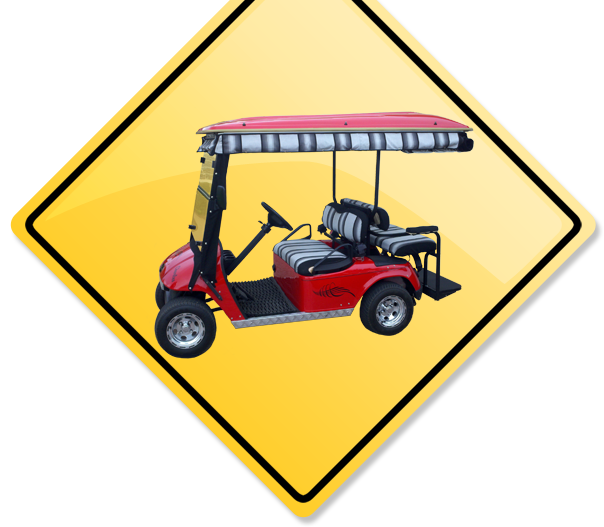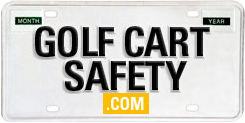

DO I HAVE A CASE?
NEED LEGAL ADVICE?
If you or a loved one has suffered injury in a golf cart accident or golf cart crash, please contact us for a free golf cart accident consultation regarding your legal rights. We have experience litigating and trying cases regarding golf cart crashes and golf cart accidents. We can help.
Do You Really Need Golf Cart Insurance?
Yes. You absolutely need to have golf cart insurance. Here's why...
I. INTRODUCTION/FORGET WHAT YOU KNOW
In order to understand the basics of insurance coverage for golf carts, it is important first to understand the basics of automobile insurance coverages in Florida. First and foremost, forget what you know about automobile insurance in New York, Michigan, or whatever state from which you retired. If you are a Florida resident with a car registered in Florida, then Florida law applies.
In Florida, the law only requires PIP or No-Fault coverage. Many drivers in Florida take this as an invitation by the State of Florida to drive with minimal or no coverage on their vehicles. It is estimated that approximately 30% to 40% of all Floridians do not have any automobile insurance at all, or have no bodily injury liability coverage to protect you in the event they hit you. The Insurance Research Counsel reports that 23% of Florida drivers carried no automobile insurance as of 2007 and that the number could increase to 28% by 2010. The number becomes higher when considering the number of drivers without bodily injury liability coverage.
II. AUTOMOBILE INSURANCE COVERAGE IN FLORIDA
Insurance agents typically sell automobile insurance coverage to help one purchase what the law requires and to help protect their assets. The conscientious insurance agent also sells additional coverage to the insured to protect the insured for their own injuries in the event of a crash.
A. PIP/No Fault Insurance
In the State of Florida, the Personal Injury Protection Insurance law, also known as “No-Fault” Insurance, requires that owners of motor vehicles registered in Florida1 purchase Personal Injury Protection (PIP) which includes property damage liability coverage. PIP coverage generally protects you, resident relatives, and persons operating or occupying the motor vehicle for injuries incurred as a result of an automobile crash. It can also apply if you are struck by a motor vehicle while you are a pedestrian. PIP coverage typically pays 80% of your medical expenses, and 60% of your lost wages, and other non-medical expenses up to $10,000.00.
As of January 01, 2013 treatment for an emergency medical condition is required before $10,000 in PIP coverage is available. If no emergency medical condition is diagnosed, $2,500 is the amount available under PIP. You must seek medical treatment within fourteen (14) days of a crash to qualify for PIP benefits.
Property damage liability of $10,000, also required by Florida’s PIP law, generally covers damage to the other vehicle if you, the insured, are negligent in an automobile crash. As such, it is recommended that you have adequate coverage on your own policy to protect your interests and those of your loved ones.
B. Bodily Injury Liability (BI) coverage generally provides that the insurance company will pay damages for which an insured becomes legally required to pay as a result of personal injury to another from a crash resulting from the ownership, maintenance, or use of the insured motor vehicle. Because of the proliferation of litigation and the potential of a judgment collectible against your assets, it is strongly recommended that you purchase Bodily Injury Liability (BI) coverage to protect you if you, or the operator of your vehicle, are negligent in a crash.
C. Uninsured/Underinsured Motorist Coverages
In all too many traffic crashes in Florida, the at-fault party has no Bodily Injury Liability coverage available, or worse, no insurance whatsoever. Because many negligent drivers fail to insure themselves or inadequately insure themselves, it is strongly recommended that you purchase Uninsured/Underinsured Motorist (UM) coverage which protects you and your resident relatives if you are in a crash and the at-fault party has no Bodily Injury Liability coverage or inadequate liability insurance coverage. Due to the minimal requirement for insurance in Florida -- where the law only requires $10,000 in Personal Injury Protection coverage -- it is critical to protect yourself in case you are involved in a crash that is not your fault. If you have further questions regarding your insurance coverage, we advise you to contact your insurance company and/or your insurance agent to make sure you have adequate liability and uninsured/underinsured motorist coverage.
D. Other Coverages
Other coverages that are typically part of automobile coverage include Collision and Comprehensive coverages for your automobile. Collision coverage is a “no-fault” coverage that pays for damage or destruction to your automobile in the event of a crash. Collision coverage is no-fault which means that it will cover the damage to your vehicle regardless of who is at fault in a crash. Comprehensive coverage generally covers property damage or the total loss to your vehicle except where caused by a collision. Events which might trigger this comprehensive coverage include fire, hurricane, tornado, theft, flooding or windstorm damage.
Rental coverage and emergency roadside assistance coverages are also sometimes part of automobile insurance. These coverages are usually supplemental in nature, and can provide added protection. Finally, Medical Payments insurance (Med Pay) generally covers you or a resident relative who is injured and incurs medical bills as a result of a motor vehicle crash. Medical payments coverage is also a no-fault coverage which applies regardless of who is responsible for the crash.
III. GOLF CART INSURANCE COVERAGE
Now, is everyone ready for a pop quiz on automobile insurance coverages? Just kidding . . . but now you are ready to wade into the sometimes murky waters of golf cart coverage. To understand golf cart insurance, you have to begin with Florida’s laws regarding golf carts. Initially, a golf cart is a motor vehicle for some purposes, and is not a motor vehicle for other purposes. Murky, right?
To clear up the confusion, for purposes of Florida’s PIP statute, a golf cart is not a motor vehicle because it is generally not required to be licensed for use on the highways of this state.2 Practically, this means that in most cases, although not all, your golf cart generally will not be covered for crashes under your traditional automobile coverage or Florida’s PIP coverages. Because the PIP statute’s coverage of $10,000 is not available for injuries suffered arising out of the use of a golf cart, there is a gap in insurance coverage for the medical expenses of persons injured while using a golf cart. For this reason, it is recommended that you purchase medical payments coverage for your golf cart, if available.
Next, under Florida’s motor vehicle law, a golf cart is a dangerous instrumentality.3 The owner of a golf cart, because it is a dangerous instrumentality, is responsible for the damages caused by anyone using it with the owner’s permission. Accordingly, it is critical to purchase liability coverage in case property damage or bodily injury results from a golf cart incident, regardless of who is using it – if you are the owner, or if you will be using a golf cart. The unfortunate reality is that owners of automobiles and golf carts are almost always named as defendants in lawsuits to answer for damages -- even if they were not driving or present at the time of the golf cart crash.
If 30 to 40% of automobiles have no bodily injury liability coverage, close your eyes and imagine what percentage of golf carts are not insured. Because of the significant number of golf carts and automobiles that have little or no insurance, it is again recommended that you purchase uninsured/underinsured motorist coverage. Practice the Babiarz golden rule of insurance -- insure for yourself as you would have others insure for you.
Most insurance companies cover golf carts as a component or rider under a homeowner’s insurance policy, or under an automobile insurance policy, or under a separate recreational motor vehicle policy. It is crucial to read your homeowner’s insurance policy to determine exactly what coverages are provided for your golf cart. Many of these policies cover only property damage liability which means that if you are involved in a crash, you could be unprotected. When purchasing golf cart coverage, always ask your insurance agent specifically to list your golf cart as an insured item under your policy. Additionally, request adequate bodily injury liability, uninsured/underinsured motorist, and medical payments coverage. If you can afford it, buy an umbrella policy for additional protection. How much coverage you should purchase varies from person to person. However, the general rule should be to purchase enough coverage to protect you and your assets in the event of a crash.
In sum, you absolutely, positively should have golf cart insurance. You are the person in the best position to purchase adequate coverage before something bad happens. You and your family are the most important people you know, so protect yourself and your family. As a practical matter, uninsured/underinsured motorist coverage is utilized very often to pay medical bills, lost wages, and to compensate for pain and aggravation. Finally, purchase medical payments coverage in at least $10,000 where available to protect you in your golf cart. Purchase umbrella coverage for additional bodily injury and uninsured motorist protection if you can afford it. Be safe and happy motoring!
Disclaimer This article is a general analysis of the current law and is not meant to provide legal advice. For specific legal issues applied to a given set of facts, always contact competent legal counsel. The author, Tim Babiarz, practices Personal Injury and Insurance Law in The Villages and the Tri-County area, including Marion County, Sumter County, Lake County, and surrounding counties in Central Florida. He can be reached at 352-205-7599 or by e-mail and at www.BabiarzLawFirm.com.
- 1 See Section 627.733(2) (every non-resident owner or registrant of a motor vehicle that has been physically present in Florida for more than 90 days during the preceding 365 days must maintain the required security). See Epperson v. Dixie Insurance Co., 461 So.2d 172 (Fla. 1st DCA 1984).
- 2 See Section 627.732(3) definition of “Motor Vehicle” as (“any self-propelled vehicle with four or more wheels which is a type both designed and required to be licensed for use on the highways of this state.”)
- 3 See Meister v. Fisher, 462 So.2d 1071 (Fla. 1985) (“Golf cart is a dangerous instrumentality for purposes of imposition of liability on owner.”)


